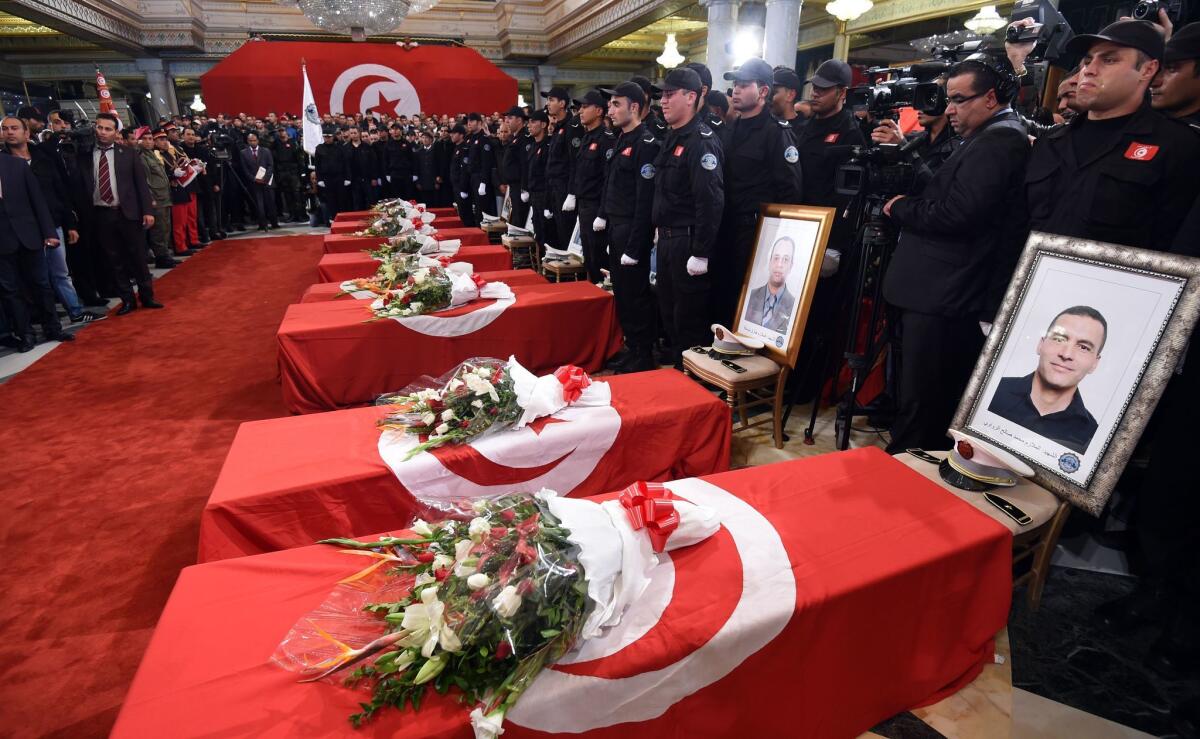Islamic State claims Tunisia attack; bombing suspect’s body found

Coffins of the presidential guards who were killed in a bomb blast in central Tunis the previous day are viewed during an official ceremony to honor them on Wednesday.
- Share via
Reporting from Tunis, Tunisia — The body of a suspected suicide bomber was found at the scene of an attack on Tunisia’s presidential guard, and the Islamic State claimed responsibility Wednesday for the attack that left 13 people dead.
Tuesday’s attack on a bus carrying Tunisia’s presidential guards involved about 22 pounds of military explosives, the Interior Ministry said.
The blast rattled the country after a particularly violent year. If the Islamic State group was indeed behind it, it is the latest of several major attacks in Europe and the Mideast seeding terror well beyond its base in Syria and Iraq.
Tunisian authorities discovered the body of a 13th person in the bus, believed to be the “terrorist who caused the explosion,” the Interior Ministry said in a statement Wednesday.
Ministry spokesman Walid Louguini told the Associated Press on Wednesday that the 13th body couldn’t be identified by fingerprints because no fingers were found. The ministry said a DNA analysis of the body is underway.
The government declared the blast a terrorist attack and imposed a 30-day nationwide state of emergency, with troops fanned out across the capital.
NEWSLETTER: Get the day’s top headlines from Times Editor Davan Maharaj >>
The Islamic State issued a statement posted online Wednesday saying a militant it identified as Abu Abdullah al-Tunisi carried out the attack after infiltrating the bus and killing around 20 “apostates.”
Earlier this year, the country suffered two major attacks by Islamic extremists that targeted tourist sites.
The blast on a tree-lined avenue in the heart of Tunis is a new blow to a country that is seen as a democratic model for the region. It came days after authorities visibly increased security in the capital and deployed security forces in unusually high numbers.
The U.S. State Department denounced the attack and the United Nations Security Council pledged support for Tunisia’s young democracy.
Iyad Madani, secretary general of the Organization of Islamic Cooperation — the world’s largest bloc of Muslim-majority countries — strongly condemned the attack. In a statement Wednesday, Madani expressed his solidarity with Tunisia and said such acts of terrorism are seeking to alter the country’s “moderation and tolerance-driven model of society.”
ALSO
Pentagon inquiry finds human, technical errors led to Kunduz hospital airstrike
Canada plans to resettle 25,000 Syrian refugees by the end of February
L.A.’s ‘soft targets’ draw more scrutiny in the wake of Paris attacks
More to Read
Sign up for Essential California
The most important California stories and recommendations in your inbox every morning.
You may occasionally receive promotional content from the Los Angeles Times.










